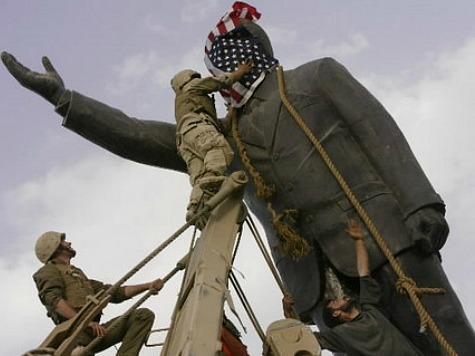
One of Prager University’s core tenets involves sharing information that isn’t taught in most colleges.
That certainly applies to the nuances of the Iraq War, a subject the left seized upon ever since the first shot was fired with their stranglehold on academia and the press.
“The narrative about the Iraq War, whether one thinks it was wise or not … has been conquered by the anti-Bush left,” Prager says. “The left-wing narrative has prevailed. Bush lied, people died.”
Except, as the new Prager University course says, President George W. Bush didn’t lie, nor did the country take on the fight to gain Iraq’s oil reserves.
The online university, which delivers sobering courses in roughly five minutes, turned to English historian Andrew Roberts to guide us through recent history.
Why America Invaded Iraq reminds us of Iraqi President Saddam Hussein’s cruel reign, his aggressive actions in an already tense geopolitical neighborhood and how both U.S. political parties insisted the leader had weapons of mass destruction.
Context is crucial when recalling why the U.S. led a coalition of countries to depose Hussein.
“People do forget, the man invaded another country,” says Prager, hardly a common action since the end of World War II. “He wanted to annex Kuwait, make it another province of Iraq.”
Hussein also regularly paid $25,000 to the families of Palestinian suicide bombers and harbored known terrorists, so his support of terrorism was well established.
As to the “lie” regarding WMD, Roberts recalls in the video how the world viewed Hussein’s arsenal prior to the war.
“There was no reason to doubt [Hussein] had WMD. He used poison gas in his war against Iran … no one, not the Germans, not the Russians, not the British, had any doubts about this,” Roberts says during the course. The historian adds that Hussein could have followed the 16 “reasonable” UN resolutions meant to avoid a military conflict but chose against it.
“Saddam spent the 1990s defying and mocking America and Britain in every possible way,” Roberts says. “He attempted to shoot down Royal Air Force and U.S. Air Force planes over the no-fly zones created to prevent him from mass slaughtering his own citizens. He corruptly profited from the UN “Oil for Food” scandal while Iraqi children starved to death.”
Prager says he was never “sanguine” about the invasion of Iraq, but once the war began he was “passionately in favor of our winning and establishing a democracy.” What he doesn’t believe in, no matter the course of action, is not finishing the job at hand.
“You can’t prematurely leave a country. We’re still in Germany with troops and Japan with troops,” he says. “If we’re going to leave before our goals were accomplished, don’t go in.”
Once again the U.S. is mulling military action against a Middle Eastern country, this time the leader is President Barack Obama and the country is Syria. Prager doesn’t draw parallels between the two situations.
“Nobody wants troops [on the ground]. There’s no real analogy,” he says, but he fears Obama’s waffling on the matter has weakened America’s standing in the world.

COMMENTS
Please let us know if you're having issues with commenting.